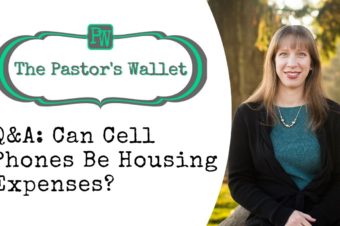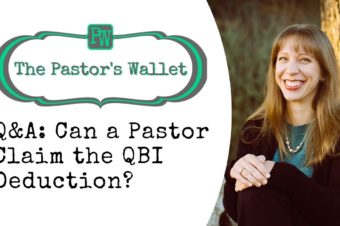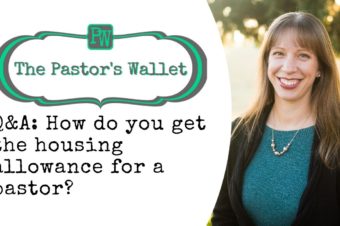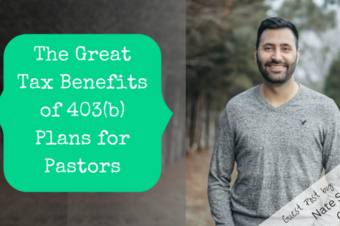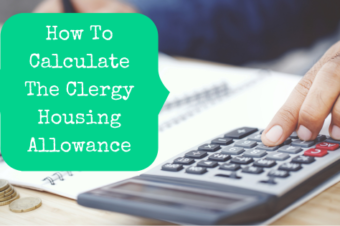If your church has a budget for tax-free ministry-related travel expenses, does that include family members’ expenses if they travel to a conference with you?
The Top Ten Personal Finance Blog Posts for Pastors of 2021
In 2017, I started the tradition of ending the year with a report of the top 10 most viewed blog posts on Pastor’s Wallet. I thought it might be helpful for new subscribers and others who may have missed something that would have interested them.
While it has served that purpose, it’s also been interesting to see the trends of what pastors are interested in over time. Certain topics rise in popularity for a season, such as 2018’s articles on the tax law changes, while others are always in demand regardless of what is going on in the world, as you’ll see below.
Drum roll, please. Ladies and gentlemen, here we have it: the top ten personal finance blog posts for pastors of 2021:
1. How Much Housing Allowance Can A Pastor Claim?
This one rose to the top this year because it is something that applies to just about every single pastor. The IRS places restrictions on how much housing allowance a pastor can claim and this article explains each one in detail. This is foundational information that every pastor needs to know.
2. Secular Jobs For Pastors: 9 In-Demand Skills You Already Have
This article has been in the top 3 since I wrote it in 2018 and spent the last two years in the number one spot. It makes me a little bit sad because it shows that a lot of pastors are looking to leave the ministry, but I figure the secular workplace is much better off for it. We need more shining lights out there in the world!
3. How To Calculate The Fair Market Rental Value For The Clergy Housing Allowance
The number one spot on this list discusses the limitations on the amount of housing allowance a pastor can claim. One of those is that it cannot exceed the fair market rental value of the home. How do you know what that is? Read this article!
4. 2020 Housing Allowance For Pastors: What You Need To Know
Don’t let the 2020 date fool you with this article. The information regarding timing, amounts, calculations, overestimating, and the effects of having a side gig is all still accurate and relevant. The only dated part of this article is in regards to how the housing allowance affects the Child Tax Credit. For 2021, it has no effect at all. Going forward, it will depend on what Congress decides to do with the Child Tax Credit long-term. When you read in the news that the credit is “fully refundable,” that means that your housing allowance will not affect it.
5. Do Pastors Pay Social Security And Medicare?
This article addresses a common point of confusion regarding clergy taxes. As with so many things in life, the answer to the title question is, “It depends.” The article discusses how the taxes work, whether or not pastors have to pay them, and how pastors actually go about paying them when they have to.
6. Are Pastors Eligible For Public Service Loan Forgiveness?
There was a change in the laws related to Public Service Loan Forgiveness this summer, so we dusted off this old post and updated it. When it was on the top 10 list back in 2019, it was very rare that a pastor was eligible. Now it’s shot back onto the list because the religious restrictions were removed. If you have federal student loans, this is a must-read.
7. Health Insurance For Pastors: What Are Your Options?
Despite the attempt to fix it with Obamacare, healthcare is still a major issue here in the United States, especially for the self-employed and people who work for small organizations. Like many pastors. This article details your different options, whether you’re trying to get health insurance on your own or if your church is willing to help. You’ll actually be surprised at how many different options are available.
8. How A Parsonage Allowance Works
Live in a parsonage? Enough people do for this article to make it into the top 10 this year for the first time. It details the requirements for claiming a parsonage allowance, how it is taxed, and how it should appear on your W-2.
9. Business Ideas For Pastors Who Want To Make Extra Money
Here is another article that addresses pastors looking to make money outside of the church. Not surprisingly, it has been on the top 10 list since it was written in 2018. All 15 business ideas included are still just as relevant and accessible today as they were when it was written.
10. What Expenses Qualify For The Minister’s Housing Allowance?
The housing allowance is one of the biggest financial benefits available to pastors. It isn’t any wonder that half of this list addresses it. This article is important because it gets into the nitty-gritty practicality of what expenses actually qualify. It is definitely another must-read.
There you have it, the top 10 most viewed Pastor’s Wallet articles of 2021. What do you think? Is there one you’re surprised to see or surprised you didn’t see? Share in the comments!
What Are The Different Parts Of A Minister’s Compensation Package?
The Apostle Paul told Timothy in 1 Timothy 5:17-18 that “The elders who direct the affairs of the church well are worthy of double honor, especially those whose work is preaching and teaching. For Scripture says, “Do not muzzle an ox while it is treading out the grain,” and “The worker deserves his wages.” (NIV)
I agree. You are worth your wages. But what are your wages?
We commonly think of wages as simply your salary, what you get paid to work. However, compensation can be a whole lot more than just a salary. This is especially true for pastors because of the unique opportunities that you have access to. There are a number of different things that comprise compensation, but they can be broken into two basic categories: income and benefits.
Ministerial Income
Income is actual money that’s coming to you. It’s something tangible that you can put in your bank account.
Salary
A pastor’s salary isn’t much different than anyone else’s salary. It’s money that you get paid for doing a job. You have to pay taxes on the money and you get to do whatever you want with it.
Social Security & Medicare Offset
Pastors are dual-status taxpayers for Social Security purposes and thus have to pay both the employee and employer portions of that tax. If you’re not familiar with that, follow the link in the last sentence or none of this will make sense to you.
Some churches feel bad that pastors have to pay the employer portion of the Social Security and Medicare taxes and want to help them cover the cost. They calculate how much an employer would normally pay for the pastor, 7.65%, and pay that as additional salary. It is a nice gesture and definitely helpful to the pastor. Nevertheless, a Social Security and Medicare offset is simply additional taxable income in the eyes of the IRS.
Housing Allowance
Another type of income unique to ministers is the housing allowance. This site has all kinds of articles related to the housing allowance and I even wrote a book on it.
Basically, the housing allowance is income that is exempt from federal income taxation and can only be used for qualified housing expenses. It is also exempt from most state income taxes as well. Nevertheless, it is not exempt from Social Security & Medicare taxes.
Equity Allowance
The final type of pastoral income is specific to pastors who live in a parsonage. A parsonage is church-provided housing. As such, a pastor who lives in a parsonage does not have the opportunity to build home equity. When the ministry position is gone, the pastor has to start from scratch with housing.
This is the opposite experience for most Americans who purchase a home. As they pay down their mortgage and home values rise, their equity increases. Many people are able to pay off their mortgage by the time they retire so that they have lower housing expenses in retirement and a valuable asset that they can pull equity from if necessary.
Pastors who live in a parsonage often find themselves at retirement homeless and equity-less. To make up for that, many churches pay their pastors an equity allowance to help build towards purchasing a home in retirement. If they pay it directly to the pastor’s retirement account, it receives tax benefits and the pastor cannot access it for other things until retirement. If it is given as a cash payment, it is treated as taxable income by the IRS.
Ministerial Benefits
While income is money that you get, benefits are more of services or products provided to you. They are not cash and will not grow your bank account, but they are still very important to your overall financial life.
Health
One of the most valuable benefits that an employer can provide is health insurance. It is much more expensive to purchase health insurance as an individual than through a group policy. Also, premiums paid through an employer-sponsored health insurance plan are tax-free. Other health-related benefits that churches can provide to all of their employees are dental and vision insurance, health reimbursement arrangements, flexible spending accounts, or health savings accounts if in conjunction with a high-deductible health insurance plan.
Life Insurance
Another benefit that is helpful to both the pastor and the church (because they would want to care for the pastor’s family if anything happened) is life insurance. Up to $50,000 of group term life insurance can be provided tax-free and the premiums on any amounts above that are considered taxable income to the pastor (based on specific IRS calculations).
Disability Insurance
Most pastors are at greater risk of becoming disabled than dying. As such, disability insurance is a very valuable benefit. Like health insurance, it is also much more affordable when purchased as part of a group plan rather than as an individual.
Retirement Savings
A retirement savings account, usually a 403(b), is a benefit that has multiple advantages for pastors. Not only are pastors able to save for retirement pre-tax, but having a church-sponsored retirement plan makes it possible to claim a housing allowance in retirement and also entirely avoid paying Social Security and Medicare taxes on contributions.
Paid Leave
Even God took time to rest. As such, it is important for pastors to have access to paid leave (and a culture where they are encouraged to take it). It can be broken down in different ways, but paid leave can include sick days, holidays, vacation time, family leave, professional development, outside ministry, and sabbaticals. It is also important for the church to respect the pastor’s time off and pitch in to get work done while the pastor is away.
Parsonage
All of the other benefits (not income) listed here can be given to all church staff but a parsonage is only for ordained, licensed, or commissioned ministers. A parsonage is a church-owned home that a pastor gets to live in income tax-free.
Those are the different pieces that can be fit together to create a ministerial compensation package. Both pastors and their churches should understand these different components in order to create a tax-efficient compensation package that meets the pastor’s needs. Pastors, share this with whoever in your church makes salary decisions, whether it’s a board of directors, stewardship committee, an HR department, or whoever. Sit down and review it together to make sure your church is fulfilling 1 Timothy 5 to the best of its ability.


